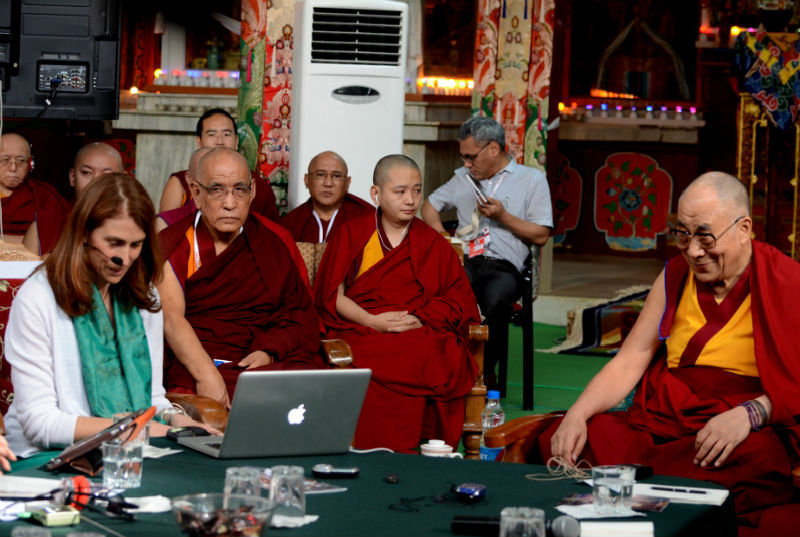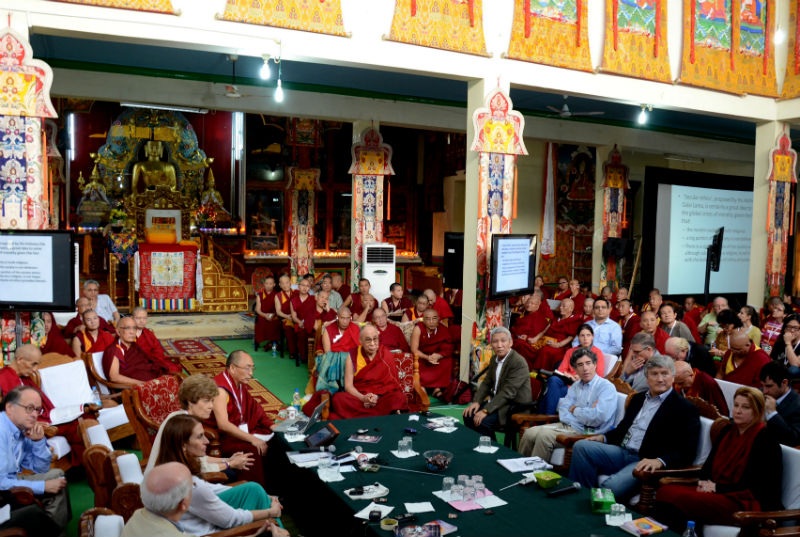Mundgod, Karnataka, India: - The spiritual leader of Tibet, His Holiness the 14th Dalai Lama arrived at Mundgod for Mind & Life meeting today, 21 January, his shoulders draped with a green shawl that he explained he had been given by people who had just met him seeking his support for the local polio vaccination campaign. His Holiness laughed to see that the day's first presenter, Sona Dimidjian, was wearing almost exactly the same colour.

Sona Dimidjian, who works with patients struggling to cope with depression, provides an opportunity to deal with conditions that are otherwise difficult to treat. Mindfulness Based Cognitive Therapy is a useful collection of practices, with mindfulness in this context meaning paying attention in the present moment, nonjudgmentally, as Sona said to His Holiness,
"You have told us how important it is to have courage and confidence. Once patients say 'I don't want to be sad,' we can help them regulate their sadness and become well again."
She described using mindfulness of the breath, the body, hearing, thinking and experience of emotions. In addition, cognitive behavioural therapy is used to learn what are the warning signs of the onset of sadness and depression and to focus on the process of thought.

His Holiness asked if in clinical studies and practice patients' background, their education, economic status, whether they are religious or not, is taken into account. And if so, are different treatments employed? He said the depression is something that intrigues him, especially when it affects lamas. He finds himself wondering, "How can that be?"
Arthur Zajonc, a physicist and the author of several books related to science, mind, and spirit, is interested in how contemplative practice can contribute to education. He feels that if it is introduced to students at undergraduate level it helps them learn about who they are and to leave university as better human beings. He quoted his favourite contemplative, Einstein as saying: 'He who can no longer pause to wonder and stand rapt in awe, is as good as dead.'
Bearing in mind His Holiness's encouragement to explore ways of introducing an appreciation of human values into contemporary education, Arthur suggests that contemplative practice can support and develop attention and emotional balance. It can become a mode of inquiry leading to insight. It leads to a transformation of the world around us and ourselves because it enables us to cultivate empathy, altruism and compassion. Even these young children respond positively to mindfulness. He said,
"We have a great opportunity to treat the child in his or her own terms rather than as a small adult. We try to be compassionate in the way we see the child."
Geshe Ngawang Samten, Director of the Central Institute of Tibetan Studies, Sarnath, began by explaining why the secular approach to ethics that His Holiness is proposing is such an excellent idea.

"Many people are not aware of how the mind functions. They do not know that anger, for example, is unhealthy. They have many misconceptions about their mental states that can be cleared up when we have prepard the proposed map of the mind. This will place positive change within reach."
He said that when secular ethics has been incorporated into the school curriculum we will surely begin to see results. Delhi University, where His Holiness spoke about this last week, is keen to do introduce a sense of ethics and human values without a religious flavour. This is an example of why the secular approach is appropriate. In the context of impermanence, which is an aspect of reality, and the view of interdependence or emptiness, Buddhism has developed various methods for training the mind.
At this point His Holiness interjected, "In the education field what we need is a secular ethics. Unless we effect change there will be terrible trouble. We have to think about generations to come; like us they too will want to live a happy life."